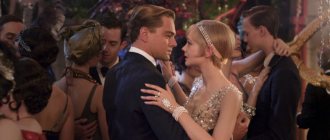New in blogs
Author: Igor Gindler
Hitler was a very good student. Those who have read Mein Kampf will find many good words about America there. More precisely, not about all of America, but about the numerous attempts of American socialists to change the foundations of the American way of life.
Hitler took the ideas of forced sterilization and forced abortion from the founder of feminism, American socialist Margaret Sanger. Madame Sanger even founded a special clinic for mass abortions of blacks in order to reduce their number and then completely destroy blacks in America. This organization still exists today - it is Planned Parenthood.
The idea of a “final solution” to the Jewish question was simply borrowed by the German National Socialists from the idea of a “final solution” to the black question by American progressive socialists.
Hitler also adopted the idea of mass cleansing of society from “undesirable elements” using gas chambers from American intellectuals. At the beginning of the twentieth century in America there was a science (more precisely, a pseudo-science) of eugenics. This pseudo-science was very popular in progressive socialist circles (now it seems wild, but even in our time there are pseudo-sciences popular among leftists - “global warming,” for example).
Hitler was for many years a subscriber to the main scientific journal of American racist eugenicists. There he discovered the proposal of the American progressive socialist Paul Popen for the mass euthanasia of “undesirable elements” using gas chambers. Popein's book Applied Eugenics is still sold in the United States.
I know that many of my readers had relatives who died in gas chambers. My family is no exception - everyone in our family died in the Holocaust except my grandfather’s family (which, by the way, is why our surname is so rare).
The gas chambers are to blame for the American socialists who proposed this idea, and the German socialists who introduced this idea. Germany's infamous 1935 race laws, which left Jews completely disenfranchised, were copied by the National Socialists from American Jim Crow segregation laws. German lawyers did not think long and in most cases simply replaced blacks with Jews in the text of the laws. Jim Crow laws were passed by Democratic governments in most Southern states.
Here in America, many of the Jim Crow laws lasted until 1965. By the way, Democratic Senator Al Gore (father of former US Vice President Al Gore) voted against the civil rights bill in 1964.
Why are these racial laws called Jim Crow? “Jim Crow” was a popular caricature nickname for the black population in the 19th century. What were the Germans called in the Soviet Union during the war? They were called "Kruts". "Kruts" are Germans. And Jim Crow means blacks.
Racist Jim Crow laws are pro-black laws. The racist Nuremberg Laws of 1935 were laws about Jews. In fairness, it should be noted that on the issue of “racial purity” the National Socialists were more humane than the American socialists, and the Nuremberg Laws were less racist than the Jim Crow laws. But both laws were adopted by politicians who were on the left flank of the political spectrum.
The darling of “progressive humanity,” Franklin Delano Roosevelt, nominated Hugo Black, a former member of the Ku Klux Klan, to the post of Judge of the US Supreme Court. Black was one of the Supreme Court's longest serving judges and infamously defended Roosevelt's decision to force all Japanese Americans into concentration camps during World War II.
About 10 years ago, at the International Numismatic Convention in New York, I came across a 1939 Third Reich coin in the denomination of 5 marks. The coin was unusual - there was some kind of long inscription on the edge. I carefully rewrote it: “Gemeinnutz gehtvorEigennutz.”
The translation of this inscription is familiar to anyone who has ever lived under a totalitarian socialist regime - “The public good is above the good of the individual.” There was nothing sensational in this inscription - ordinary fascism. Another demonstration of Hitler’s concept of a “socialist people’s state.”
But literally a few days later I came across this phrase for the second time. This time - from the lips of Hillary Clinton (not word for word, but in meaning, and the phrase “public good” was present).
Benito Mussolini's father was a member of the First Communist International along with Marx and Engels. Towards the end of his life, he went completely crazy with Marxist ideas, to the point that he took part of the payment for his services (he was a blacksmith) by forcing his clients to listen to hours-long lectures on Marxism. Little Benito completed a full course of historical and dialectical materialism while still at school age. As a result, immediately after school, at the age of 18, he joined the Socialist Party.
Barack Obama joined the Socialist Party (Democratic Socialists of America - DSA) not immediately after school, but a little later, right after Harvard.
Of course, many of my readers find the selection of facts in this article very unpleasant. But I must remind everyone of the famous quote by George Orwell, who said: “Freedom is the right to tell people what they do not want to hear.”
If you don't want to hear that your relatives died because of misanthropic socialist ideology, this could become a big problem for you in the future.
If you are a member of the US Democratic Party and do not want to hear about your ideological brethren in the party - Nazis, fascists, socialists, communists - this may become a big problem for you in the future.
If you don't want to hear that the organized crime group Antifa, created by activists of the US Democratic Party, is a fascist organization, this could be a big problem for you in the future.
If you don't want to hear that the white supremacist organization Ku Klux Klan was created by activists of the US Democratic Party, this could be a big problem for you in the future.
If you don't want to hear that the organization of black racists Black Lives Matter was created by activists of the US Democratic Party, this could be a big problem for you in the future.
If you don't want to hear that the Democratic presidential candidates were essentially a Menshevik (Hillary Clinton) and a Bolshevik (Bernie Sanders), this could be a big problem for you in the future.
If you don't want to hear that the US Democratic Party has become America's leading anti-Semitic and anti-Israel party over the past decade, this could be a big problem for you in the future.
If you don't want to hear about any of this and would rather just shrug off what's happening in America now, this could be a big problem for you in the future.
But we should not forget the words of the wise Greek politician and military leader Pericles, said back in the 5th century BC: “Just because you are not interested in politics does not mean that politics will not be interested in you.”
What we are seeing now, after the final takeover of the US Democratic Party by neo-Marxists, after 8 years of the first anti-American American President Obama, must be taken seriously. Very seriously.
Not only American conservatives, but also American leftists are calling for seriousness. Professor Nahum Chomsky, who has an unquestioned authority on the left, recently wrote that “Antifa is a major boon to the right.”
Mr. Chomsky has seen a lot in his time, and he correctly assessed the threat from the fascist monster created by the American left. This monster could spin out of control at any moment and bury any hope of making the Democratic Party respectable. Indeed, what respectable party would rely on a gang in black alaSS clothing, which operates strictly by Gestapo methods?
Especially for the American emigrant audience, I want to admit that in this regard I am very disappointed. It seemed to me that all former homo soveticus had an amazing ability, inaccessible to native Americans, to read between the lines.
It seemed to me that all former homo soveticus came to the New World with a strong inoculation against socialism and its variety - fascism.
It seemed to me that former homo soveticus would instantly recognize fascism in any form, regardless of the slogans with which neo-fascists hide behind themselves.
It seemed to me that the former homo soveticus would instantly determine that two competing factions of American fascists clashed in Charlottesville.
It seemed to me that all former homo soveticus, having access to all the world's mass media in America, would certainly come to the conclusion that modern Russia is an aggressor state.
I was wrong. Not all. Well, as the classic noted, “ordinary people... in general,
they resemble the old ones... the housing issue only spoiled them.” For those who have not been spoiled by the housing issue, let me remind you of Reagan, who prophetically predicted: “If fascism ever comes to America, it will be called liberalism.”
Political terminology can, of course, change over time.
But good and evil are never relative. Good and evil are always absolute.
..And, in full accordance with Orwell, read the comments to the article, do yourself a favor.. - L.A.
Eleanor Roosevelt - great mind, great woman
Unlike all previous presidential wives, Eleanor used the media to introduce the public to her wide and comprehensive activities. Eleanor is the prototype of the modern First Lady, who takes part in public life, demonstrating autonomy and independence. Like none of her predecessors in the White House, after the death of her husband, she further strengthened her prestige with her own achievements.
Anne Eleanor Roosevelt was born on November 11, 1884 in New York City, the first child of Elliot and Annie Livingston Hall Roosevelt. The parents' marriage broke up due to the father's addiction to alcohol.
In her early childhood, Eleanor was not particularly beautiful. She called herself the "ugly duckling." Her mother, on the contrary, was considered a beauty. The autobiography begins with the words: “My mother was one of the most beautiful women I have ever seen.”
In December 1892, when Eleanor was eight years old, her mother died of diphtheria, and two years later she lost her beloved father. After the death of her mother, Eleanor and her two brothers moved to New York to live with their grandmother. Valentine Hall was a wealthy widow and decided to give her orphaned grandchildren a good upbringing. Eleanor took lessons in riding, dancing, singing and music, and then began to study literature.
At receptions, this not very beautiful girl did not attract much attention. She did not excel in dancing, so she did not always feel good in the company of her peers. She was already a teenager when, at one of her family celebrations, she was asked to dance by a distant relative, Franklin from Hyde Park.
Her uncle, future President of the United States Theodore Roosevelt , encouraged her to play sports. When one day she was afraid to go into the water, he simply pushed her into the pool, and then taught her to swim and jump from the diving board.
When she turned 18, her grandmother decided it was time for her granddaughter to finish her education in England and return home to look for a suitable spouse. In New York, social life awaited her: receptions, balls, evenings over a cup of coffee. These events were not to her liking, and not every young man dared to invite a girl of such tall stature (more than 180 cm) to dance.
Eleanor, who even now considered herself an “ugly duckling,” was tall and slender, but her protruding teeth spoiled her face. Sometimes at family gatherings she would meet a distant relative, Franklin. This tall, slender, sociable young man of pleasant appearance became interested in Eleanor. Both had serious intentions in life, both were keenly interested in social and political problems. In intimate conversations, Eleanor emanated some kind of attractive charm.
They began dating, and in November 1903, Franklin proposed to her. Eleanor was surprised: “I won’t be able to keep him near me. He looks so good . But when her amazement subsided, she emphatically said “yes.”
She later recalled that they were both too young and inexperienced at the time. When they decided to get married, she was sure that she was in love with him. “But only now do I know, many years later, what it means to really be in love and to love.”
In the fall of 1904, Eleanor and Franklin set their wedding day for March 17, 1905, when President Theodore Roosevelt was scheduled to arrive in New York City to host the traditional St. Patrick's Day Parade.
Eleanor and Franklin had six children, five sons and one daughter. Anne was the first child (born in 1906). After her were born: James (1907), Franklin (1909, died at the age of eight months), Elliot (1910), Franklin Delano (1914) and John Aspinwall (1916). All children's first marriages broke up. Then they remarried, some of them stood before the altar for the third and even the fourth time.
While Franklin Delano Roosevelt gradually rose through the ranks, Eleanor became interested in politics. “It is the duty of every woman to live in the interests of her husband ,” she said. In 1910, when Franklin was seeking a senatorial position in New York, Eleanor considered politics a man's occupation, surprised that her husband advocated for women's voting rights. Franklin convinced her that women should have equal rights with men.
During the First World War, Eleanor helped with the work of the Red Cross, sewed clothes for soldiers, and worked in the soldiers' canteen, although until the end of her life she remained an unimportant cook. The only dish she was good at was scrambled eggs, so she often offered them to guests. In addition, she completely rejected alcoholic drinks.
In 1918, Franklin returned from a trip to Europe with pneumonia. Eleanor cared for her sick husband and looked through his correspondence. It was then that a letter came into her hands, from which it followed that her husband maintained an intimate relationship with a certain Lucy Page Maser, a young, beautiful woman who had been his secretary since 1914. This discovery nearly destroyed their marriage. Many years later, Eleanor confidentially told her friends: “The whole world collapsed for me then.” At first she offered her husband a divorce, but then they came to the conclusion that, given the interests of the children and his political career, such a decision would be unwise. Franklin promised to break up with Lucy, and Eleanor forgave him for his adultery, but fired Lucy, who soon entered military service. In 1920 she got married. Many years later, Roosevelt resumed his relationship with the now widowed Lucy. On the day of his death, April 12, 1945, she was with him in Warm Springs. Eleanor never spoke out about this in writing, but she told her friends: “I can forgive, but not forget.”
She was actively involved in the problems of American women, especially working conditions in industrial enterprises. More and more men went into military service, and the number of women working in enterprises increased, so in October 1919, Eleanor took part in the International Congress of Working Women.
In 1920, Roosevelt was nominated for vice president by the Democratic Party. Eleanor participated in the election campaign, helping prepare speeches, and publicly supported the League of Nations, which the Republicans bitterly opposed. Conducted a major campaign to attract American women to vote. I learned typing and shorthand.
In August 1921, 39-year-old Franklin Roosevelt contracted polio. His mother insisted that he withdraw from public life, but Eleanor objected vigorously. Encouraged by his wife, he began to fight the disease. He perceived any achievement as an important victory, although for the rest of his life he could only move in a wheelchair. Many years later, Eleanor recalled that “my husband’s illness finally forced me to stand on my own two feet. His illness left an imprint on my attitude towards his life, my life and the lives of our children.” She considered that winter of 1921-22 “the most difficult test of her life.”
Roosevelt decided to continue his political career, Eleanor actively helped him in this. She invited politicians to Roosevelt's residence, gave speeches, raised money for the Democratic campaign, and even got a driver's license, although she was never considered a good driver. One of her many published articles during this period was entitled "Why I Became a Democrat?" In it, she speaks not only on her own behalf, but also on behalf of her husband: “The Democratic Party cares more about the welfare and interests of society than about the interests of large capitalists.” At first, she assured her husband that she would work actively until he regained his strength, but soon declared that political activity brought her moral satisfaction.
Eleanor was also involved in economic issues, which was not entirely usual for that time. Together with her friends, she bought a school for girls in New York, was the deputy director there and taught history. In addition, she opened a furniture factory, which employed unemployed people from rural regions.
In 1928, Franklin Delano Roosevelt became governor of New York. For Eleanor this meant additional responsibilities. As the governor's wife, she visited prisons, hospitals and other public institutions and told her husband about their work. Their opinions did not always coincide. The main controversy was caused by Prohibition, which Eleanor wanted to preserve. She did not share her husband's critical attitude towards the League of Nations, but on the vast majority of issues discussed, their opinions coincided. When the Democratic Party nominated Franklin Roosevelt for the presidency in 1932, Eleanor initially restrained her emotions, but during the election campaign she helped her husband by collecting the necessary materials for his speeches. She appeared with him at meetings, worked in the women's department of the Democratic Party. In honor of Franklin Delano Roosevelt's victory over Hoover on election night, she even drank some champagne.
She was well aware that her husband became president at an extremely difficult time: the United States was experiencing a deep crisis, many people had lost their jobs, did not have the basic necessities of life, and the collapse of banks and enterprises had become a widespread phenomenon.
Since her husband became president, she has done everything to help him fulfill his duties. She often traveled with him around the country and met with voters. She was already familiar with slums, orphanages and factories. A cartoon appeared in the satirical New Yorker magazine: miners are working underground, one of them, throwing away his pick, raises the lamp higher and says to another: “My God, Mrs. Roosevelt is coming towards us.”
The American aristocracy, traditionalists, racists and conservatives of various kinds could not forgive Eleanor for having so much “in common with this rabble.”
One day Eleanor visited a school for difficult children, which she partially financed, and when she saw how dirty the premises were, she took a broom and began to sweep the floor.
During World War II, Eleanor Roosevelt visited a prison in Baltimore. To get there on time, she left the White House early, without even telling her husband where she was going. After dinner, Roosevelt wanted to discuss some issues with his wife, so he called his secretary and asked where Eleanor was. "In prison, Mr. President." “ I’m not surprised,” came the answer. “But what did she do?”
Eleanor Roosevelt patronized the National Youth Organization, founded in 1935 to help young people find work. As First Lady, she visited urban neighborhoods where blacks lived, opposed the poll tax, supported laws prohibiting lynching, and hired blacks to work in the White House. Some of Roosevelt's staff were of the opinion that she was being too provocative towards blacks.
Roosevelt usually reacted very calmly to criticism of Eleanor: his wife goes “wherever she wants, talks to whomever she wants, and learns something along the way.” If Eleanor asked her husband if he had any problems with her activism and speaking, he would reassure her with the words: “Lady, we are a free country. I use my own methods of communicating with my compatriots, and if I have any difficulties, I will always find a way to protect myself from them.”
Eleanor was constantly traveling. To the delight of airline owners, she loved to fly and flew more than 50,000 km in the first year of her life in the White House, and 68,000 km in the second. She was called the "flying First Lady." At a time when flying by plane was considered dangerous, she greatly contributed to changing this opinion.
Not everyone liked the frequent trips of the president's wife. Some believed that she should pay more attention to her family or keep order in the White House. But it was unfair. She was always with her children if they had any problems, was with her son James when he had a major operation in Minneapolis; was with Franklin when he was in a car accident in Virginia; came to Seattle to visit her daughter Ann when her first child was born, and in California she was with Elliot when he was about to separate from his wife.
Voters who knew about her participation in social, economic and political life bombarded her with letters; in 1943 alone, she received more than 300,000 of them, which the staff read and sorted by topic; Eleanor answered many of them herself, and passed others on to the president.
In the mid-thirties, at the insistence of friends, Eleanor began keeping a diary. After finishing the work, she showed the memories to her husband so that he could make adjustments. The diaries were published in 1937 under the title This Is My Story and became a bestseller.
Eleanor Roosevelt had a liberal mindset. In 1936, she left the conservative organization Daughters of the American Revolution after she was refused a concert hall in Washington for the famous black singer Marion Anderson.
Eleanor did not want to have personal protection, so the security service offered her to carry a weapon, but she rejected this offer. After much persuasion, she agreed to learn shooting at the FBI shooting range. I visited there several times, but J. Edgar Hoover told Roosevelt: “If there is anyone in America who should not bear arms, it is your spouse. She can’t even get into the barn gate . Later, one of Roosevelt's guards, Earl Miller, taught her how to use a gun, and from then on she had a gun in her car, although not always loaded. Eleanor valued Miller's company, which was immediately reflected in the rumors. They said that they knew each other quite closely. Miller once said, “Don’t sleep with someone they call Mrs. Roosevelt.”
Eleanor did not dress very elegantly. And this, perhaps, should be considered one of its advantages. During the crisis, fashionable clothing could only cause unnecessary outrage. When she learned that she was included in the list of the ten most elegant women, she asked incredulously: “Really?” Eleanor usually held three appointments a week. It was believed that she was the eyes, ears and legs of the president, so she was where he had to work hard to get to. Very often she received guests instead of him.
Eleanor did not smoke and did not like women who smoked, but she overcame this dislike and even created a precedent by introducing the custom of offering cigarettes to ladies after dinner.
If Eleanor Roosevelt was not in Washington, the duties of First Lady were performed by her daughter Anne, whom Franklin trusted very much and called his girlfriend.
Eleanor shocked many by hosting the British royal couple, George VI and Elizabeth, at a picnic in Hyde Park in June 1939, where they served the most common American “hot dogs.” However, they say that the royal couple liked them.
Roosevelt's opponents questioned whether polio had affected his sanity. One day at an event in Akron, Ohio, one of the participants asked Eleanor about this. She replied, “I’m really glad you asked this question. My answer is yes. “Everyone who has managed to survive such a terrible disease develops a sense of compassion and understanding of the problems of humanity.” The audience rewarded her with thunderous applause.
Eleanor was of the opinion that, having served two terms as president, her husband should no longer run for office, but the outbreak of World War II led to Roosevelt again seeking the presidency in 1940. This was unprecedented in the history of the United States. At the party convention in Chicago, Eleanor nominated Roosevelt. Despite some resistance, he was included in the list of candidates for the third time.
During World War II, Eleanor had the official position of Vice-Director of Civil Protection. This post meant for her not only caring for bomb shelters, hospitals, private homes, orphanages, and recreational facilities, but also moral support for society. This understanding of his responsibilities met with sharp criticism from conservatives. Eleanor relented, and the office was closed six months later, but she continued to actively fight against discrimination in the army and for the acceptance of refugees in the United States.
She spent a lot of time traveling. She visited American soldiers at the front, always appearing unexpectedly, without warning. At the stronghold of Esperitu Santo in the New Hebrides, the commander forbade soldiers to be naked in the rain, fearing an unexpected visit from Eleanor Roosevelt.
Once Harry Cooper performed on one of the Pacific islands. Suddenly one soldier asked: “Where is Eleanor?” With a serious expression on his face, Cooper replied: “On one of the islands where we were recently, her footprints were seen on the sand, but where they lead is difficult to determine.” In 1942 she visited American soldiers in Great Britain, in 1943 she made a similar trip to the South Pacific, including Australia and New Zealand, and in 1944 she visited American military bases in the Caribbean and Central America. During a trip across the Pacific Ocean, she definitely wanted to visit the island of Guadalcanal, which belonged to Japan, but was captured by the American army with heavy losses. The general commanding the island objected, since the Japanese continued to carry out air raids on the island, but Eleanor insisted on her own and still visited it. While at the front, Eleanor talked with soldiers, gave autographs, took letters from soldiers and, returning to Washington, sent them to loved ones. She constantly shared all her impressions from trips and meetings with her husband, who listened carefully and benefited from her suggestions.
Franklin Roosevelt often joked about his wife's power in the White House. He once told one of his interlocutors: “Never start arguing with Eleanor, you won’t be able to win.” He always listened to his wife with great interest and respect.
Mira Gatin writes: “Eleanor Roosevelt had far more influence over presidential decisions than any other First Lady before her. She was part of her husband’s government and was often his conscience, especially when it came to “new affairs.”
In April 1945, Eleanor was in a Washington store when a telephone call demanded that she immediately return to the White House. The reason was not given, but it was clear that “something terrible” had happened. Franklin Delano Roosevelt was vacationing in Warm Springs at the time, where he suffered a cerebral hemorrhage and died without regaining consciousness.
When Eleanor was told this sad news, she said: “I feel more for our country and the whole world than for myself.”
Everything about everything
Who is speaking or what is being said?
TOPIC-REASON “Let us welcome a new, caring and thinking Citizen of our country.”
I hope the author of the topic will not take my comments like a stone in his garden... The topic is just a convenient visual example.
A striking example. In fact, the situation is so common that it cannot be reproached by anyone. This is... common. Norm. That's what everyone does, right? Both supporters of the government and its opponents, both residents of Russia and citizens of other states, near and far, get personal. This is used as an argument both in discussions of famous personalities and big political events, and in forum disputes directly against opponents in the forum. Fat or thin, beautiful or ugly, rich or poor, successful or not, it all comes into play. The desire to find a painful place and hurt your opponent...
I got distracted, as usual... but let's return to the sample topic.
What do you think after reading the start topic of the topic? What's the first thing that comes to your mind? What would you answer, or maybe have already answered to the author?
It would seem that the starting message itself does not contain anything like that, right?
Formally and outwardly, the start topic does not contain any hints at discussing the personality of Mr. Zverev. But let's look deeper, let's “look at the root,” as Kozma Prutkov advises. What is the purpose of this topic? What does the author want to talk about? About environmental problems? About interaction between Russia and China? It is the answers to the questions why and for what that allow us to see the picture.
Here it’s not a sin to remember another wise (in my opinion) advice-quote: “Don’t think about what they asked, but about why? If you guess why, then you’ll understand how to answer.” © Maxim Gorky
There are such eccentrics (fools?) in society that it’s not a sin to laugh at, right? What's bad about it? Everyone does it. This is fine. And people like them on the forums.
Compared to them, it’s easy to consider yourself smart, right? This is their undoubted charm for society. Do you agree with this? Do you practice?
Let's move on. What does this ranking of people in society lead to? On the smart and not so smart, on those worthy of attention, and on those whose opinions are ignored as the norm for society.
It leads to the fact that the right to have one’s own opinion must be earned in one way or another. And this right can be deprived if certain conditions are not met. This is what we clearly observe in modern Russia.
Human angels are (to put it mildly) rare. And therefore, any person can be presented in such a light that he will fall into the category of persons whose opinion is neglected.
Nowadays, the opinions of famous and popular people are considered important. But they are also divided into respected people and people unworthy of respect. The history of recent years has shown how easily, if desired, those with leverage over the masses through the media can change the category from the first to the second. I think you can easily remember the names and name them yourself.
Another criterion that currently exists (besides popularity) is financial solvency. “If you are so smart, then why are you so poor?” Ah... You don't have money? Yes, what can you even know and understand? Agree, it’s a very convenient thing that allows you to ignore the opinion of the majority of the country’s population.
The most interesting thing in this situation is that the same, majority of the population is satisfied with the introduction of criteria for the right not only to speak, but to have one’s own opinion.
The solution and way out is simple.
Recognition of the right to have one's own opinion for everyone. Encouraging reflection and seeking one's own opinion. Respect for each person's opinion. Your personal respect for your interlocutors, no matter what views they hold.
Or maybe it will do? Don't you need to change anything?
With respect to you and your opinion, Margot.










